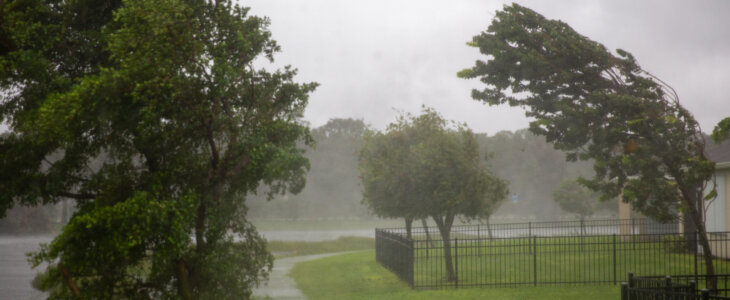Pensacola is no stranger to severe weather. From hurricanes to heavy storms, residents know how quickly conditions can become dangerous. Unfortunately, these weather events can lead to personal injuries, along with property damage and infrastructure destruction. When a storm hits, the chance of being involved in a car accident, suffering a fall, or experiencing other weather-related incidents rises sharply. But what happens when you need to file a personal injury claim after a severe weather event? This blog from Staples Law Group explores how Pensacola’s weather can impact personal injury claims and what steps to take if you find yourself injured during such an event.
Common Types of Personal Injuries During Severe Weather
Severe weather often brings about conditions that make accidents more likely. Here are a few common types of personal injuries that tend to happen:
- Car Accidents: During storms, roads become slick, and visibility decreases, leading to a rise in car accidents. Due to high winds and wet surfaces, drivers may skid, hydroplane, or lose control.
- Slips and Falls: Wet sidewalks, debris, and pooling water all create hazardous walking conditions. People can easily slip and fall while navigating storm-damaged areas.
- Property Damage Injuries: Severe weather often causes damage to buildings and homes. Falling debris, collapsing structures, and other storm-related hazards can result in serious injuries.
Injuries sustained during severe weather can be just as traumatic as those from regular accidents. However, when filing a personal injury claim, proving liability can become more complex due to the involvement of natural forces.
Challenges in Filing Personal Injury Claims After Severe Weather
Filing a personal injury claim following a weather event can be more challenging than a standard claim. Several factors come into play, especially when nature is involved.
- Determining Liability: In most personal injury cases, proving liability is essential. However, the line between nature and human responsibility can blur when severe weather is a factor. For example, if a driver crashes due to slick roads, is the driver at fault, or was the weather the main culprit?
- Delays in Investigations: When a severe storm hits, the focus is often on cleanup and emergency services. This can lead to delays in gathering evidence or investigating the scene of an accident, which may affect the timeliness of your claim.
- Difficulty Gathering Evidence: Storms often destroy or alter accident scenes. Critical pieces of evidence, such as skid marks on the road or hazardous conditions at a business, may be wiped away by rain or wind before they can be documented.
The Role of Insurance in Weather-Related Personal Injury Claims
When severe weather is involved, insurance claims can become particularly tricky. Insurance companies may argue that injuries caused by natural disasters aren’t covered under standard policies.
- Understanding Weather-Related Coverage: Depending on the circumstances, some insurance policies might cover injuries sustained during severe weather, while others may exclude weather-related claims. Understanding your policy’s language is critical to knowing whether you’re entitled to compensation.
- Disputes with Insurance Companies: Insurers often try to minimize payouts by arguing that the weather itself, rather than any negligent party, caused the injury. This can make negotiating with insurance companies difficult, especially without legal representation.
- Coverage Exclusions: Many policies have exclusions for damages caused by “acts of God” or natural disasters. This means insurance companies may deny a claim if they believe the injury was caused by uncontrollable natural events rather than human negligence.
How Severe Weather Affects Liability
Liability is one of the key factors in any personal injury case. In severe weather situations, proving liability becomes more challenging, but it’s not impossible.
- Negligence vs. Natural Causes: Although severe weather can create hazardous conditions, property owners, drivers, and others still have a duty to act responsibly. For instance, a property owner who fails to clear debris or repair damage caused by a storm may still be held liable for an injury occurring on their property.
- Comparative Fault: Florida follows a comparative fault system, meaning that multiple parties can share blame for an accident. Even if severe weather is partly responsible, a negligent driver or property owner can still be held partially liable for your injuries.
- Proving Duty of Care: Despite bad weather, individuals and businesses are still responsible for keeping others safe. For example, a business may be required to take extra precautions, like putting out wet floor signs or closing temporarily, to prevent injuries during a storm.
Legal Strategies for Personal Injury Claims in Severe Weather Cases
While filing a personal injury claim after a severe weather event is challenging, an experienced attorney can use several strategies to help build a strong case.
- Proving Negligence: A vital part of any personal injury claim is proving that another party was negligent, even in extreme weather. For example, if a driver was speeding or a business failed to address a known hazard, these factors may support your claim.
- Gathering Evidence: Attorneys can gather critical evidence, including weather reports, accident scene photos, and witness statements, to prove that negligence contributed to your injury. Expert testimony from accident reconstruction specialists or meteorologists can also help strengthen your case.
- Local Knowledge: Working with an attorney who understands Pensacola’s unique weather patterns and local laws is invaluable. They can anticipate challenges and help you navigate complex claims related to severe weather.
Protecting Your Rights After a Weather-Related Injury
Severe weather can significantly impact personal injury claims, making them more complicated but not impossible to pursue. Whether you’ve been injured in a car accident, a slip and fall, or suffered another type of injury during a storm, seeking legal help is essential. An experienced personal injury attorney can guide you through the process, help prove liability, and work with insurance companies to get you the compensation you deserve. If you’ve been injured in Pensacola during a severe weather event, contact us to discuss your case and protect your rights.

